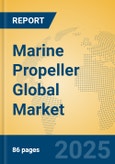Introduction
Marine propellers are essential components in maritime propulsion systems, converting engine power into thrust to propel vessels efficiently across water. These devices, available in various designs like fixed-pitch and controllable-pitch configurations, are crucial for optimizing fuel efficiency, maneuverability, and performance in diverse marine environments. They are integral to merchant ships for cargo transport, naval vessels for defense operations, recreational boats for leisure activities, and other specialized applications such as offshore support vessels. The market is propelled by the expansion of global trade, with seaborne trade volumes exceeding 11 billion tons annually, alongside rising demand for fuel-efficient and environmentally compliant propulsion solutions. Increasing focus on decarbonization, driven by international regulations on emissions, has accelerated innovations in hybrid and electric-compatible propellers. Additionally, the growth in shipbuilding, particularly in Asia, and the modernization of naval fleets worldwide further stimulate demand, as propellers must handle higher loads while minimizing vibrations and noise for enhanced operational reliability.
Market Size and Growth Forecast
The global marine propeller market is projected to reach between USD 3.0 billion and USD 5.0 billion in 2025, with a compound annual growth rate (CAGR) of 5% to 10% through 2030, reflecting the steady expansion in shipbuilding and propulsion upgrades amid sustainability pressures.
Regional Analysis
North America: The U.S. dominates with robust naval investments and recreational boating sectors, while Canada emphasizes efficient propulsion for commercial fishing and icebreaker vessels.
Europe: Germany, the UK, and Finland lead, supported by stringent environmental standards and advanced shipbuilding capabilities, focusing on low-emission propellers for ferries and offshore wind support.
Asia Pacific: China and South Korea drive rapid growth through massive shipyard outputs, with Japan prioritizing precision engineering for high-speed vessels, and India expanding its merchant fleet.
Rest of the World: Brazil invests in propeller technologies for oil and gas exploration ships, while Australia enhances capabilities for patrol boats, and the Middle East, particularly Saudi Arabia, adopts advanced systems for diversified maritime operations.
Application Analysis
Merchant Ships: Expected growth of 5.5-9.5%, fueled by surging global trade and containerization trends. Developments center on fuel-efficient designs to reduce operational costs in bulk carriers and tankers.
Naval Ships: Projected growth of 6.0-10.0%, linked to fleet modernization and geopolitical tensions. Advances prioritize stealthy, high-thrust propellers for submarines and frigates.
Recreational Boats: Anticipated growth of 4.5-8.5%, driven by rising leisure activities among high-net-worth individuals. Trends highlight lightweight, corrosion-resistant materials for yachts and speedboats.
Others: Expected growth of 4.0-8.0%, encompassing offshore vessels and research ships. Innovations focus on adaptable systems for harsh environments like arctic operations.
Type Analysis
Fixed Pitch Propeller (FPP): Expected growth of 4.5-8.5%, valued for simplicity and reliability in constant-speed applications. Trends emphasize durable alloys to extend service life in merchant fleets.
Controllable Pitch Propeller (CPP): Projected growth of 5.5-9.5%, essential for variable-speed operations and enhanced maneuverability. Advances include hydraulic controls integrated with hybrid engines for naval and offshore uses.
Others: Anticipated growth of 4.0-7.5%, covering ducted propellers and azimuth thrusters. Developments prioritize modular designs for easy retrofitting and reduced maintenance in specialized vessels.
Key Market Players
Leading firms include Nakashima Propeller, renowned for custom high-performance designs; Rolls-Royce, advancing integrated propulsion with sustainable fuel compatibility; Wartsila, innovating in controllable-pitch systems for energy efficiency; Schottel Group, specializing in azimuth thrusters for maneuverability; MAN Energy Solutions, focusing on robust engines paired with propellers; VEEM Ltd., providing precision-cast propellers for yachts; AB Volvo, enhancing recreational and commercial applications; Brunswick Corporation, targeting leisure boating with user-friendly solutions; Kawasaki Heavy Industries, emphasizing heavy-duty naval propellers; and KSOE (Hyundai Heavy Industries Co., Ltd.), driving large-scale shipbuilding integrations. These companies propel market evolution through R&D in noise reduction and cavitation minimization.
Porter's Five Forces Analysis
Threat of New Entrants: Moderate, owing to significant capital requirements for precision manufacturing and certification processes, though startups can emerge with niche sustainable innovations.
Threat of Substitutes: Low, as propellers remain indispensable for thrust generation, with limited alternatives like waterjets viable only in specific shallow-water scenarios.
Bargaining Power of Buyers: Moderate, with shipbuilders negotiating for cost-effective, customized solutions while adhering to performance standards.
Bargaining Power of Suppliers: Low, given diverse sources for raw materials like bronze and stainless steel, mitigating dependency issues.
Competitive Rivalry: High, as players vie on efficiency, durability, and integration with emerging electric propulsion, fostering continuous technological upgrades.
Market Opportunities and Challenges
Opportunities
Global seaborne trade growth, handling over 90% of world commerce, amplifies demand for efficient propellers in expanding merchant fleets.Naval modernization programs, with defense budgets rising in key regions, create avenues for advanced controllable-pitch systems in stealth-oriented vessels.
Sustainability shifts, including adoption of alternative fuels like methanol and hydrogen, open paths for hybrid-compatible propellers, as seen in recent bridge-to-propeller contracts for ferries.
Recreational boating's surge, with millions of registered vessels worldwide, boosts lightweight, high-performance designs, while emerging markets in Asia offer untapped potential through infrastructure expansions.
Challenges:
Supply chain vulnerabilities from geopolitical tensions and material shortages hinder timely deliveries of specialized alloys.Regulatory pressures on emissions and noise pollution require costly R&D for compliant designs, straining smaller players.
High upfront costs for advanced controllable-pitch systems limit penetration in budget-constrained segments like small recreational boats.
Technological integration complexities with hybrid and electric engines pose adaptation hurdles, alongside workforce skill gaps in developing regions.
This product will be delivered within 1-3 business days.
Table of Contents
Companies Mentioned
- Nakashima Propeller
- Rolls-Royce
- Wartsila
- Schottel Group
- MAN Energy Solutions
- VEEM Ltd.
- AB Volvo
- Brunswick Corporation
- Kawasaki Heavy Industries
- KSOE (Hyundai Heavy Industries Co.
- Ltd.)








